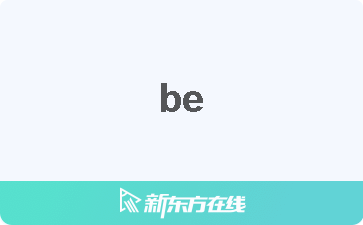be
[VERB]

if it wasn't for
1. 若不是因为
If you talk about what would happen if it wasn't for someone or something, you mean that they are the only thing that is preventing it from happening.
双语例句
例:I could happily move back into an apartment if it wasn't for the fact that I'd miss my garden.
若不是因为我会惦记着花园,我本可以高兴地搬回公寓。
PHRASE. 习语
am, are, is , being , was, were , been
1. [AUX 助动词] 后接动词的现在分词,构成动词进行体
You use be with a present participle to form the continuous tenses of verbs.
双语例句
例:This is happening in every school throughout the country.
这在全国各校都正在发生。
例:She didn't always think carefully about what she was doing.
她不总是仔细思考自己正在做什么。
2. [AUX 助动词] 后接动词的过去分词,构成被动语态
You use be with a past participle to form the passive voice.
双语例句
例:Her husband was killed in a car crash.
她丈夫在一场车祸中被夺去了性命。
例:Similar action is being taken by the US government.
类似的行动正被美国政府所采取。
3. [AUX 助动词] 后接动词不定式,表“安排、注定、必然”等意
You use be with an infinitive to indicate that something is planned to happen, that it will definitely happen, or that it must happen.
双语例句
例:The talks are to begin tomorrow.
会谈将于明天开始。
例:It was to be Johnson's first meeting with the board in nearly a month.
那将是近一个月来约翰逊与董事会的首次会面。
4. [AUX 助动词] 后接动词不定式,用于说明或询问特定情况下应该会怎样、怎样做、谁来做等
You use be with an infinitive to say or ask what should happen or be done in a particular situation, how it should happen, or who should do it.
双语例句
例:What am I to do without him?
没有他我该怎么办?
例:Who is to say which of them had more power?
谁知道他们当中谁有更大权利?
5. [AUX 助动词] was和 were接不定式表示说话时间之后发生的事
You use was and were with an infinitive to talk about something that happened later than the time you are discussing, and was not planned or certain at that time.
双语例句
例:He started something that was to change the face of China.
他发起了某项后来改变了中国面貌的行动。
6. [AUX 助动词] 后接 seen、heard、 found,表“可见到、可听到、可发现”之意
You can say that something is to be seen, heard, or found in a particular place to mean that people can see it, hear it, or find it in that place.
双语例句
例:Little traffic was to be seen on the streets.
路上几乎没有车辆可见。
7. [LINK 连系动词] 用于补充说明主语,表示其身份、性质、品质、位置等
You use be to introduce more information about the subject, such as its identity, nature, qualities, or position.
双语例句
例:She's my mother.
她是我母亲。
例:He is a very attractive man.
他是个非常有吸引力的人。
例:He is fifty and has been through two marriages.
他50岁,已经经历了两次婚姻。
例:The sky was black.
天是黑的。
例:His house is next door.
他的房间在隔壁。
例:He's still alive, isn't he?
他还活着,不是吗?
8. [LINK 连系动词] 与主语 it连用,用以描述事物或给出判断
You use be, with 'it' as the subject, in clauses where you are describing something or giving your judgment of a situation.
双语例句
例:It was too chilly for swimming.
游泳太冷了。
例:Sometimes it is necessary to say no.
有时候说“不”是必要的。
例:It is likely that investors will face losses.
那时投资者将面临亏损是很可能的。
例:It's nice having friends to chat to.
有朋友一起聊真好。
9. [LINK 连系动词] 与非人称代名词 there连用,表示存在或发生
You use be with the impersonal pronoun 'there' in expressions like there is and there are to say that something exists or happens.
双语例句
例:Clearly there is a problem here.
显然这里有问题。
例:There are very few cars on this street.
这条马路上很少有车辆。
10. [LINK 连系动词] 用于连接主语和分句或其他分句结构
You use be as a link between a subject and a clause and in certain other clause structures, as shown below.
双语例句
例:Our greatest problem is convincing them.
我们最重要的问题是说服他们。
例:All she knew was that I'd had a broken marriage.
她所知道的就是我曾有过一次破裂的婚姻。
例:Local residents said it was as if there had been a nuclear explosion.
当地居民说好像发生过核爆炸。
11. [LINK 连系动词] 用于the thing is和the point is等表达中,引导一个分句,以陈述事实或表达观点
You use be in expressions like the thing is and the point is to introduce a clause in which you make a statement or give your opinion.
双语例句
例:The fact is, the players gave everything they had.
事实是,运动员们倾尽了所有。
12. [LINK 连系动词] be有时用来替代通常的现在时形式,尤其在 whether之后
The form 'be' is used occasionally instead of the normal forms of the present tense, especially after 'whether'.
双语例句
例:They should then be able to refer you to the appropriate type of practitioner, whether it be your GP, dentist, or optician.
然后他们应当能够介绍你去见合适科别的执业医生,不管是你的全科医师、牙医还是配镜师。
VERB. 动词

关注新东方在线考雅课程中心
免费获取雅思备考资料包
雅思口语题库
扫码添加助教回复【口语题库】免费领取


 资料下载
资料下载
 公开课
公开课 编辑推荐
编辑推荐